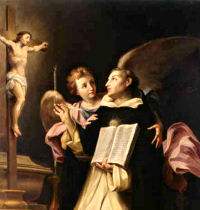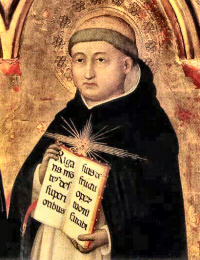Ordinary Time: January 28th
Memorial of St. Thomas Aquinas, priest and doctor
» Enjoy our Liturgical Seasons series of e-books!
St. Thomas Aquinas is the Dominican order's greatest glory. He taught philosophy and theology with such genius that he is considered one of the leading Christian thinkers. His innocence, on a par with his genius, earned for him the title of "Angelic Doctor."
Meditation: Peace, the Tranquility of Order
All Adam's faculties were perfect and perfectly harmonized. In this virgin nature, come forth from the hands of God, there was a magnificent subordination of the inferior powers to reason, of reason to faith, and of the whole being to God; a harmony which was the divine radiation of original justice. The order was perfect in Adam, complete concord reigned between all the faculties, each of which rested in its object: hence was born unalterable peace. As St. Thomas says, it is "from the union of the different appetites in man tending towards the same object that peace results": Unio autem horum motuum est quidem de ratione pacis.
Sin came into the world: all this admirable order was overthrown; there was no longer union between man's different appetites; the flesh conspires against the spirit, and the spirit wars against the flesh.
To find peace again, the desires must be brought back to order and unity. Now this order consists in the senses beings dominated by reason and the reason being subject to God: until such order is re-established, peace cannot exist in the heart. " Thou hast made us for Thyself, O Lord, and our hearts are ever restless until they rest in Thee."
But how are we to rest in God if sin has made us His enemies? In consequence of sin—Adam's sin and our own—far from being able to approach God, we are separated from Him by an abyss. Is man then for ever to be robbed of peace, is all his sighing after this lost possession to be in vain? No. Order is to be re-established, and peace restored; and you know in what an admirable manner. It is in Christ and through Christ that both order and peace are to be found again. "O God," we say in one of the prayers of the Mass, "Who in creating human nature, didst wonderfully dignify it; and hast still more wonderfully renewed it": Deus, qui humanae substantiae dignitatem mirabiliter condidisti et mirabilius reformasti. A wonder that consists in the Word being made Man, in having taken our sin upon Himself in order to offer befitting expiation to His Father, in having restored to us God's friendship and given us His own infinite merits whereby we may retain this friendship.
—Excerpted from Christ the Ideal of the Monk, by Blessed Abbot Columba Marmion
St. Thomas Aquinas
 St. Thomas ranks among the greatest writers and theologians of all time. His most important work, the Summa Theologiae, an explanation and summary of the entire body of Catholic teaching, has been standard for centuries, even to our own day. At the Council of Trent it was consulted after the Bible.
St. Thomas ranks among the greatest writers and theologians of all time. His most important work, the Summa Theologiae, an explanation and summary of the entire body of Catholic teaching, has been standard for centuries, even to our own day. At the Council of Trent it was consulted after the Bible.
To a deeply speculative mind, he joined a remarkable life of prayer, a precious memento of which has been left to us in the Office of Corpus Christi. Reputed as great already in life, he nevertheless remained modest, a perfect model of childlike simplicity and goodness. He was mild in word and kind in deed. He believed everyone was as innocent as he himself was. When someone sinned through weakness, Thomas bemoaned the sin as if it were his own. The goodness of his heart shone in his face, no one could look upon him and remain disconsolate. How he suffered with the poor and the needy was most inspiring. Whatever clothing or other items he could give away, he gladly did. He kept nothing superfluous in his efforts to alleviate the needs of others.
After he died his lifelong companion and confessor testified, "I have always known him to be as innocent as a five-year-old child. Never did a carnal temptation soil his soul, never did he consent to a mortal sin." He cherished a most tender devotion to St. Agnes, constantly carrying relics of this virgin martyr on his person. He died in 1274, at the age of fifty, in the abbey of Fossa Nuova. He is the patron saint of schools and of sacred theology.
—Excerpted from The Church's Year of Grace, Pius Parsch
Patronage: Academics; against storms; against lightning; apologists; book sellers; Catholic academies; Catholic schools; Catholic universities; chastity; colleges; learning; lightning; pencil makers; philosophers; publishers; scholars; schools; storms; students; theologians; universities; University of Vigo.
Symbols and Representation: Chalice; monstrance; ox; star; sun; teacher with pagan philosophers at his feet; teaching.
Highlights and Things to do:
- Read G.K. Chesterton's biography, St. Thomas Aquinas, The Dumb Ox, which is full of Chestertonian profundity and wit.
- Dive into the intellectual depth and beauty of St. Thomas' thought in his Summa Theologiae. Familiarize yourself with his method of inquiry by reading his section on God's attributes, especially the goodness of God. Here is a Bibliography in English.
- Read more about St. Thomas:
- Meditate upon the profound humility of St. Thomas Aquinas, whose intellectual capacity far surpasses any since his time. He stopped writing at the end of his life after having a vision of the glory of God, claiming that 'All that I have written seems to me like straw compared to what has now been revealed to me.' How often do we take pride in our own intellectual achievements, fully crediting them to ourselves?
- CatholicSaints.info has many links to readings about or by St. Thomas Aquinas.
- See St Thomas' statue on St. Peter's Basilica Colonnade.
- If you are a student or teacher, or at all concerned about the crisis of Catholic education, make ample use of the Prayer to St. Thomas Aquinas for Schools and the Prayer to the Angel of Schools.
- Read Pope Leo XIII's encyclical, Aeterni Patris, strangely relevant to our time in its exhortation towards a renewal in philosophical study with a focus on the Angelic Doctor, Saint Thomas Aquinas.
- Finally, read Pope John Paul II's encyclical, Fides et Ratio, especially the section on The enduring originality of the thought of St. Thomas Aquinas. He expresses a similar intent to that of Pope Leo XIII's in the following words, "If it has been necessary from time to time to intervene on this question, to reiterate the value of the Angelic Doctor's insights and insist on the study of his thought, this has been because the Magisterium's directives have not always been followed with the readiness one would wish."
- From the Catholic Culture library:
- Light from Aquinas
- The Meaning of Virtue in St. Thomas Aquinas
- The Philosophy of Woman of St. Thomas Aquinas.
- For many more documents search the library for "aquinas."
- See Catholic Cuisine for some food ideas to celebrate St. Thomas.








